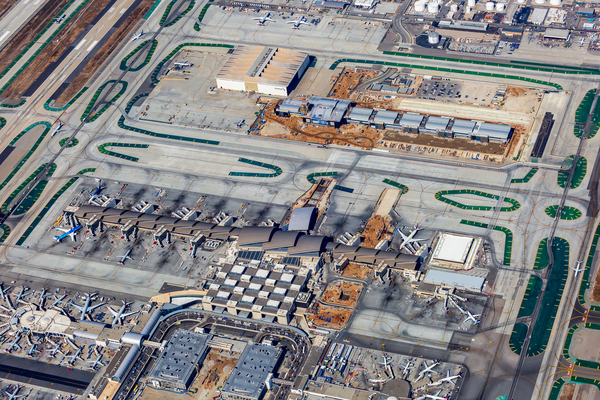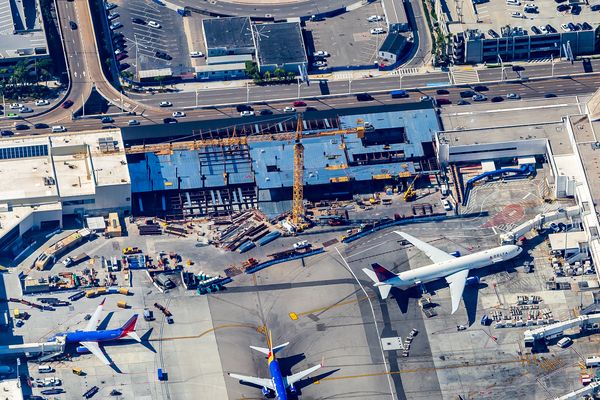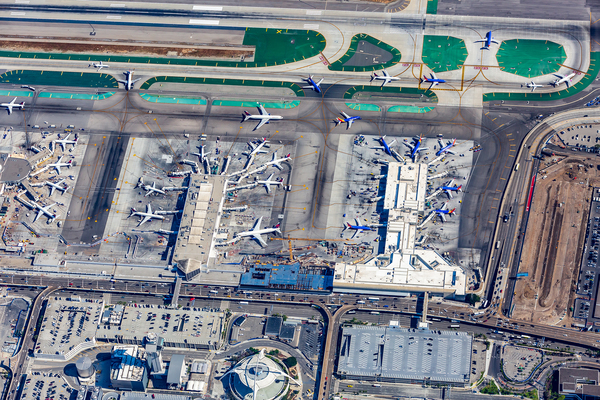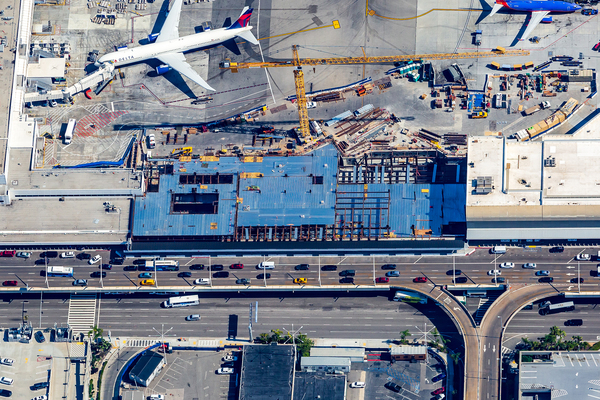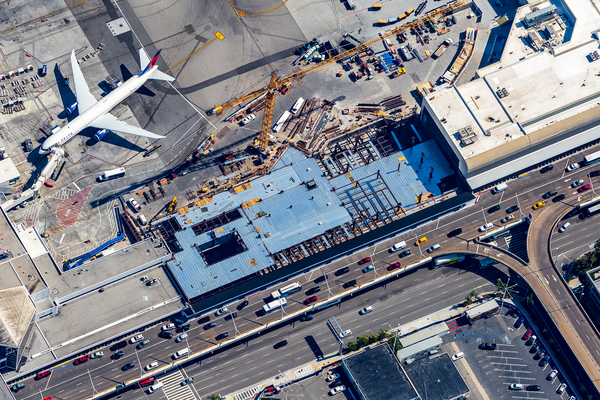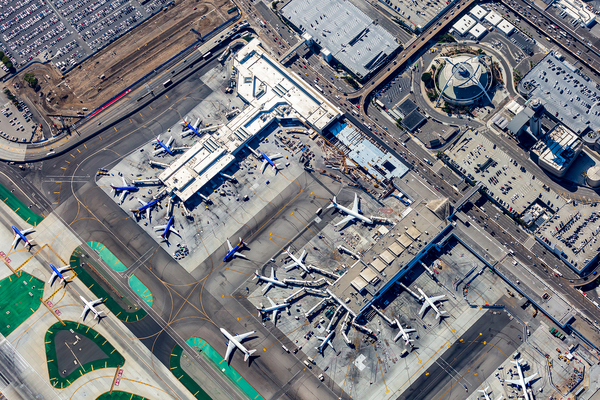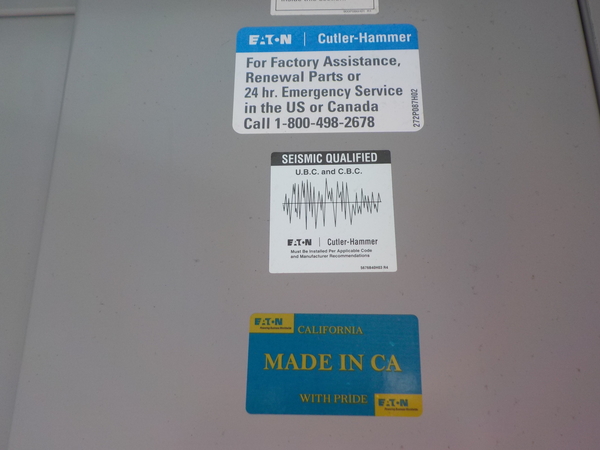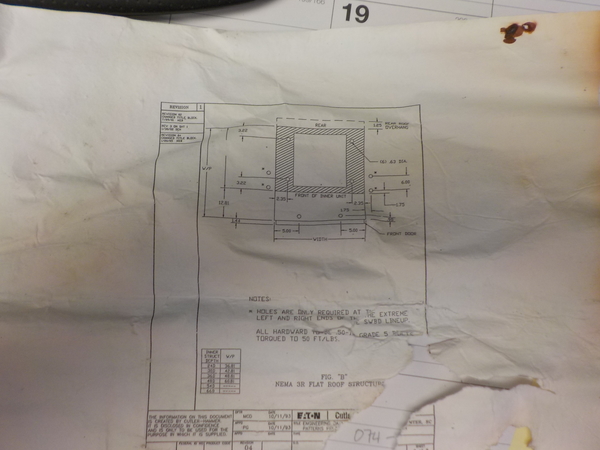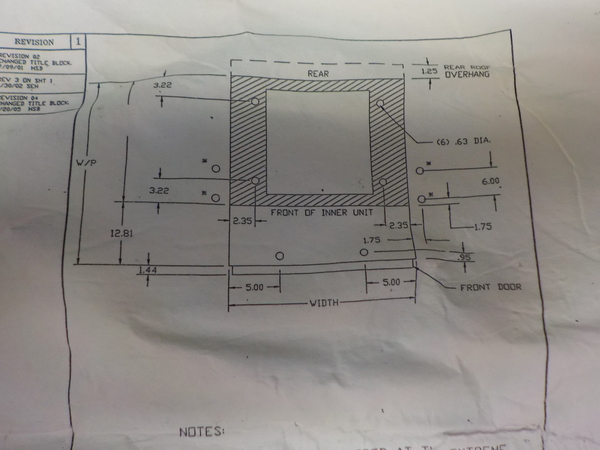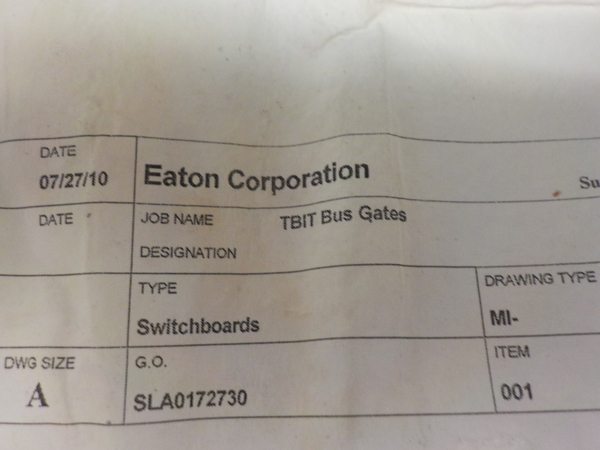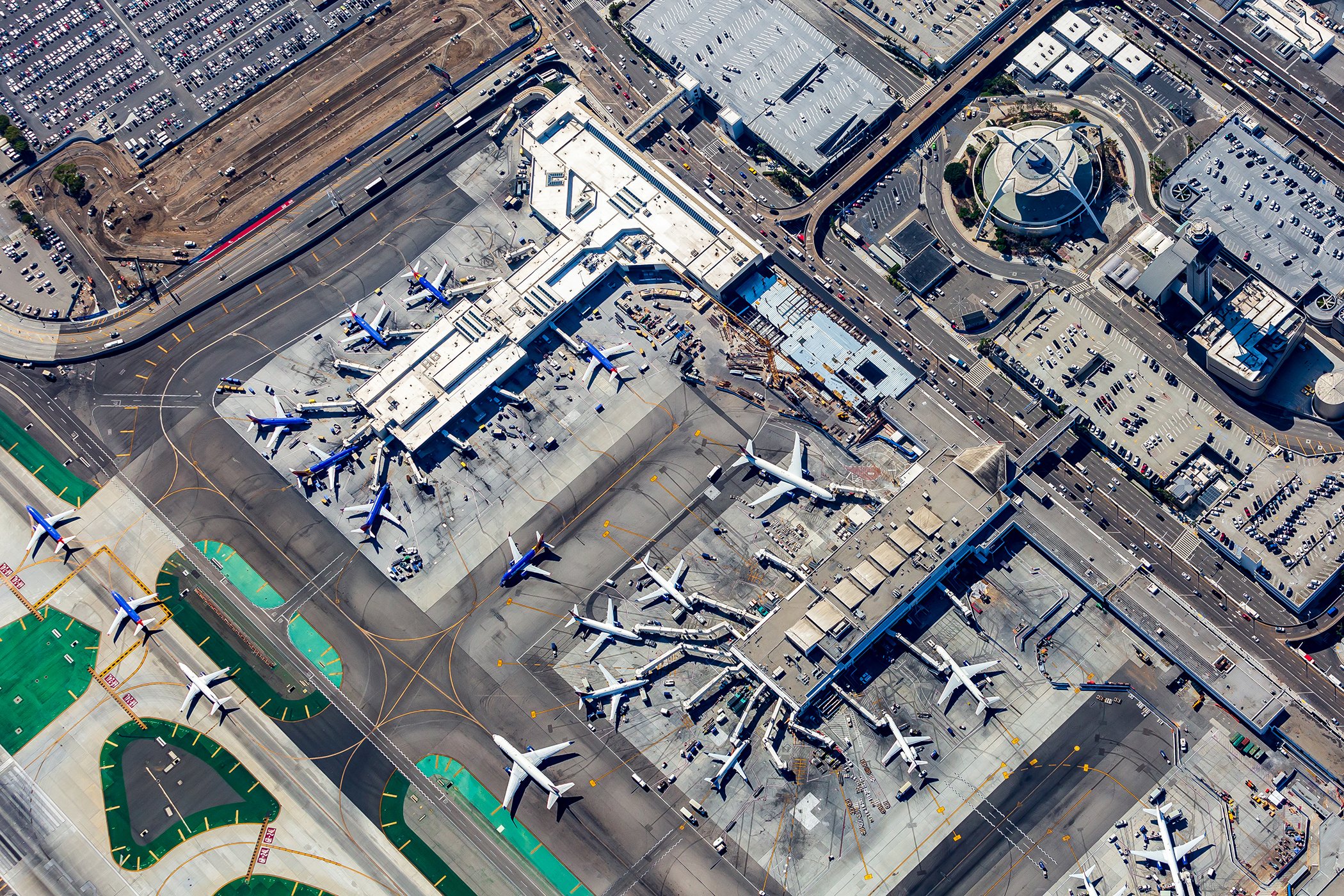
And even as judges across the state ruled against various attempts to block the law, police departments have developed a vast range of techniques to frustrate requesters by imposing countless obstacles, time-sinks, outrageous charges, and the like. There’s been a lot of discussion of this in the press, of course, the press being immediately affected by such tactics. And open discussion of these tactics is essential for any number of reasons. Just for instance it allows requesters to be able to respond effectively and legislators to be able to identify fixes. And, maybe, just maybe it might shame some of these obstructionist police departments to stop fooling around and follow the damn law.
And that is why today I have for you a detailed account of the ludicrously extreme SB1421 compliance obstruction tactics practiced by the Los Angeles World Airports Police Department, told through our email correspondence over the last year! On January 21, 2019 I sent a request to the Airport Police Department (APD, as they call it over there) for all records newly made available through SB1421.1 After about six weeks of delay and nonresponse, I finally got an email from Deputy City Attorney Karen Majovski in which she belatedly acknowledged receipt of my request and also insisted on discussing it with me over the phone under the guise of seeking clarification.
This is a typically aggressive tactic used by responding agencies. It seems intended to allow agencies to come to unwritten agreements instead of more enforceable written ones, and in the case of requesters who haven’t identified themselves, like me in this case, to intimidate them by attempting to force personal contact. It certainly can’t be required for requesters to discuss requests on the phone for the simple reason that even people who don’t have phones have fundamental rights under the CPRA, and so I always refuse. Which I did here by return email.
After some more back and forth about this during which it became exceedingly clear that Majovski did not in fact actually need any clarification,2 she finally came across, two months after my original request, with something resembling a statutorily compliant response. Basically all it says is that there’s a lot of stuff to look through and it will take forever to produce, so thanks for your patience.3 This level of noncompliance is absolutely routine and very hard to remedy under the current law. Certainly two months stalling isn’t worth a post!
Then, finally, on April 16, 2018 Majovski emailed me to let me know that the SB1421 records from 2017 were ready. And informed me of the weirdly detailed procedure I would have to follow to access the records. This email is worth reproducing here:
Hello,
My client, the Los Angeles Airport Police Division (LAXPD or Division), appreciates your patience as it completes the search for potential responsive records to your SB 1421 CPRA request.
The Division has concluded its search of 2017 records. The Division has responsive records Bates numbered SB1421 LAXPD 001 – 114, redactions pursuant to Penal Code Section 832.7, subdivisions (b)(5)&(6). These records are available for pick up Wednesday 4/17 through Friday 4/19 from the hours of 1pm – 4pm at 7303 World Way West, Second Floor, Los Angeles, CA 90045. You will need to check in with the security officer in the lobby and proceed to the second floor. Ms. Blair Benmoin will provide you with a copy of the records.
The Division has begun searching 2016 and 2015 records. Again, we appreciate your understanding and patience and will continue to communicate with you regarding this request and the Division’s rolling production.
Sincerely,
Karen Majovski
The most obviously potential violation of the CPRA announced by this email is Majovski’s insistence that I come to APD headquarters between 1 and 4 pm on one of three specified days. The CPRA is very clear that records are to be available for inspection at all times during an agency’s office hours.4 Then there’s the bit about checking in with the security officer. Checking in often requires producing ID, and it’s pretty clear that the CPRA doesn’t allow agencies to impose possession of an ID as a requirement for accessing public records.5
Finally, Majovski’s statement that they are going to give me a copy is worrisome. Many agencies insist on producing copies rather than allowing inspection since the law allows a charge for the former but forbids charging for the latter. It’s important to push back against any hint that an agency is going to charge for access on this theory. And that’s what I did in my reply to Majovski, asking “Are you proposing to charge me for these copies?” And “No,” said Majovski by reply email, “The documents will be provided at no charge.”
To those not yet wise to the wily ways of CPRA-obstructing lawyers Majovski’s offer to provide a copy for free may seem like a kindness, but it’s not. It’s meant to discourage me from insisting on inspection. Which in such a case is a terrible idea. If an agency is going to produce records electronically on their own media at their office it’s essential to check that the files are readable before leaving, unless you want to make another trip later.6
Also, as everyone knows, the airport is not an easy place to get to. It’s 90 minutes on transit from my house under ideal circumstances, and often longer.7 And even though I’m kind of adverse to using mail to conduct CPRAlogical activity, I will do it if it’s more efficient. So I replied to Majovski, asking her “Can I send you a check for postage then, rather than coming out to the airport?” And with that simple question, friends, Majovski’s mask came off!
Majovski’s reply to me, sent 22 hours later, a delay of sufficent length to be a sure sign that an opposition lawyer’s up to some bullshit,8 dropped all pretense of their policies being shaped by any purpose beyond creating delay, friction, and increasing the requester’s cost in resources to access records:
Unfortunately not.
LAXPD, the custodian of the records, is providing a copy of the records to you (free of charge) at 7303 World Way West, Second Floor, Los Angeles, CA 9004, pursuant to Government Code Section 6253(b). The records are available for pick up Wednesday 4/17 through Friday 4/19 from the hours of 1pm – 4pm. If the following dates and times do not work for you please let me know so that we can arrange accordingly. This is the method the custodian of records has established for making a copy of the records available to requestors.
Thank you,
There is so much wrong here, but it’s all underlain by Majovski’s statement that “This is the method the custodian of records has established for making a copy of the records available to requestors.” She’s telling me not to argue, that this is just how they’re doing it. Also sprinkling in a little lawyerese as a signal that I’m jurisprudentially overmatched and should therefore shut the hell up. So in my response I pushed back, but not too much yet. Still barely possible that she’s just being careless rather than evil. Also it’s essential to find out if there are electronic versions of records:
Hm. Every other time I’ve ever gotten records from LAX this is actually not how it has worked. You all have always mailed them to me in the past or else transferred them electronically. And that was many requests. Are you announcing a general change in policy for LAX CPRA matters or is there something unique about this case?
And I notice that you said that you Bates stamped the pages. If you did this with a computer program then you necessarily created an electronic record to do that. Is there some reason you can’t send me that by return email?
And I’m not kidding about every other time. Prior to this instance I’d had at least ten CPRA requests with LAWA. In every case they sent me CDs by mail or used Box.Com to transfer files. LAWA has a contract with Box to provide cloud file storage for their whole operation. But Majovski was sticking to her story. There would be no mailing of these records, not at all. And in her next reply she noted that this procedure ONLY applied to SB1421 records:
This is the process that LAXPD, the custodian of the records, has established for providing a copy of the records under SB 1421, which is a new law. This is the method the custodian will and has provided the records to all requestors of SB 1421 records.
So I replied and asked her if this were a written policy and if the records were in electronic form. And she answered me right away and told me to read her previous email, which is a sure sign that a lawyer is fed up with you and intends to cut off communication. I pushed her on the electronic file question and she finally admitted that the files were electronic and that she was proposing to require me to come to LAX in person to pick up a copy of an electronic file.
So let’s just pause for a moment and summarize where we are at. I made my request on January 21. By April 17 LAX had prepared one record. It was an electronic file which they required me to come in person to the airport on one of three days that they chose during a very narrow time period also of their choosing. They refused to transmit the file electronically and they refused to mail it. Karen Majovski specifically told me, in fact, that their policy did not allow for either electronic transfer or mailing SB1421 records irrespective of LAWA’s general CPRA policy.
Now, the CPRA explicitly requires agencies to provide copies on request9 but it is silent on the means by which the copies must be provided. It’s at least plausible that all the weirdo hoops through which Majovski was requiring me to jump satisfy the requirement to make the copies available to me. On the other hand, the law is very, very clear on the allowable conditions for inspecting records.10 As we’ve seen, records must be available for inspection during office hours.
Not only that, but even though the law grants agencies the power to set CPRA policies, it explicitly forbids them from making policies that restrict the time in which records are available for inspection.11 Therefore exercising one’s right to inspection can provide powerful incentives for reluctant agencies to comply with the law. Which is the tack I took in my next response to Majovski:
An electronic copy is available for pickup? Please confirm. Also:
I can’t guarantee that I will make it between 1pm and 4pm. But I will be there during office hours pursuant to government code 6253(a). Like between 9 am and 4 pm. Please confirm that this is OK. Also please confirm that pursuant to government code 6253(a) I will not be required to show any kind of ID in order to inspect these records.
Thanks again for your scrupulous adherence to the law!
And Majovski admits in her response that indeed, I have a right to inspect the records during office hours but, bizarrely, continues to maintain that I may not at that time pick them up. Got it? I can look at them any time but I can only take possession of them between 1 pm and 4 pm on one of her three specified days:
If you are requesting to inspect the responsive records with redactions per Penal Code Section 832.7 subdivisions (b)(5)&(6) pursuant to Government Code Section 6253(a), then yes, you may come to the same location during normal business hours 9am – 4pm–as you mention.
A disk with a copy of the responsive records with redactions per Penal Code Section 832.7 subdivisions (b)(5)&(6) is available for pick up under Government Code Section 6253(b) from Wednesday 4/17 through Friday 4/19 1pm – 4pm. If the following dates and times do not work for you to pick up the copy of records requested please let me know so that we can arrange accordingly.
It is hard to articulate how kooky this is, isn’t it? Always heighten the contradictions:
I’m asking to inspect the physical disk that contains the records which, as you know, is a record itself.
Is it part of this new policy that I can inspect the actual copy to be picked up but that I can’t pick it up?
Four hours later and Majovski had had enough of me and agreed to mail the damn data. Which, by the way, is good evidence that APD’s putative SB1421 production policy was ad hoc crapola. If it was a real policy serving some legitimate purpose they wouldn’t abandon that aspect of it just because I argued with them.12 Here is what she finally told me:
Hello,
I have consulted with my client and the Division is willing to mail you the records at no cost.
Please provide me with your mailing address and I will forward that to the Division to have the CD with the records promptly mailed to you.
Thank you
OK, then they mailed me a CD. A freaking CD. In the 21st Century. Computers don’t even have optical drives any more. But this is such a common tactic among obstructionist agencies that I actually had to buy a USB CD drive. I imagine that their lawyers are all relying on the probable difficulty in getting a judge to understand that CDs are primitive and essentially useless technology, the only plausible explanation for the use of which is to delay and obstruct access.
So fine, the CD arrived. It was broken. A lot of agencies mail me CDs and I have never had one show up broken, so probably the APD broke it just to hassle me further. Sure, yes, perhaps that sounds paranoid, but you can see the lengths they’ve gone to to create friction in the records production process. It’s an obvious step for them to have taken. But who knows, right? So I wrote back to Majovski informing her of the situation and suggesting a few much saner alternative means of data transfer to consider:
Good day, Ms. Majovski.
I received the disk today, and thank for you mailing it to me. Sadly it is broken and therefore unreadable. This, if you’re curious, is pretty much the reaons why most of the world gave up on optical disks about 10 years ago. At this point it appears that the options before us are:
a) You mail me a new disk and repeat until one of them is readable.
b) You allow me to come in and pick up a disk during office hours rather than during some arbitrary subset of office hours that only apply to people picking up disks in response to CPRA requests for material made non-exempt by SB1421.
c) You move into the 21st century and transfer the data to me via a cloud service. I know from personal experience that LAWA has used Box in the past for this. Dropbox also works well. You’re welcome to use my account at:
https://www.dropbox.com/request/GM0U4cW7Yqqk8kWrV67d
It’ll be easier for you if you zip archive multiple files into a single file unless you have access to an account. But an account is not necessary.
d) Some option I didn’t think of.
Please let me know as soon as possible. Your client’s eccentric and probably illegal insistence on transferring this data by archaic and unworkable means has already delayed my access to these records in violation of the law.
Thanks!
And, from Majovski’s response, it’s clear that at least my allegations of intentional delay pierced to some extent her veil of lawyerly dispassion, because not only did she intemperately fire off a response just 27 minutes later, not only did she refute the allegations, she refuted them with feeling. But she also said she’d ask about using different data transfer methods, a small win, perhaps:
You have always been able to come in and inspect the records. Nothing has prevented you from doing so.
If you would like to pick up a copy of the CD, we can arrange for that as I have previously indicated in prior emails. The hours were suggested to make sure that the person designated to provide the copy of records will be available to do so. I repeatedly asked you to let me know if a different time needed to be arranged. Please advise me when you would like to pick up the CD so that we can make sure someone is available to provide it to you.
Yesterday, LAXPD mailed you a CD with an electronic copy of the records. Damage through mail courier transit is at no fault of the City’s and is out of the City’s control.
There has been no delay in your access to these records on LAWA’s part.
As to your other suggestions, I have asked whether the records can be provided to you in one of the suggested methods.
Oh boy, now what? Well, they mailed me a USB drive next, this time by certified mail. This is yet another obstructionist friction-making tactic because it’s pretty likely it’s going to require the recipient to go to the post office on a Saturday, that being the only day to pick up certified mail when most people aren’t at work, and stand around waiting in line. Every extra hour or two an agency can cost a requester seems to count as a win to them. And there was one file on this 8 gigabyte USB drive that they sent me. And it was 9.4 megabytes. That is, it was far, far below the maximum size for email attachments.
Now, the next six months of this story are fairly repetitive and I’m going to skip over the details. They mailed me two more USB drives with two more files, none bigger than 23 megabytes. Then they mailed me the fourth one. And I missed signing for it because I was at work. And I waited until Saturday and went to the post office. Where I had to wait in line with all the other people who were picking up signature-required items on Saturday because they also had jobs. And it took about 40 minutes for my turn to come around. And the woman at the window told me that the carrier hadn’t returned it and they didn’t know where it was so I should come back the next day. But of course, I couldn’t come back until the next Saturday.
Which is, if it’s not what they’re counting on with their nonsensical certified mailings, certainly not a result they’re trying to avoid. And finally it seemed like too much to stand. So I renewed my efforts to try to get them to transfer the file to me by email attachment or by cloud service, which they continued to refuse to do. In fact at this point an APD administrative assistant, Blair Benmoin, told me that those methods weren’t available, whatever that means. To try to decipher what it meant I asked the Airport for recent emails with attachments of 25 megabytes or more and also emails with links to Box.Com or Google Drive.
These requests went to LAWA’s normal CPRA office which, while not perfect, is reasonably responsive and pretty honest as well. So they did in fact send me a bunch of emails with really big attachments, thus, I guess, proving that APD hadn’t made up their SB1421 production policy due to email limitations. This request also yielded the stunning aerial image shown above and a bunch of other very random but really fascinating attachments, which you can browse here on Archive.Org and look at more of the images at the bottom of this post. And one of the Google Drive links yielded this Brazilian video interview of two Los Angeles police officers in Portuguese.13
And after a great deal of argument, the APD luminary who by now I had been handed off to, Mario Patrick, while still refusing to transfer data by cloud service or email attachment, at least agreed to mail me a USB drive by ordinary mail. Which he did, finally. Which brings us to your part in the story! Obviously if they released this material to me they have to release it to you. And their process is to send it to you on a free USB drive!
Now, USB drives are about as outdated as CDs at this point. In my life, anyway, the only reason I use them is to accept data from obstructionist agencies. But if you want them you can get them from Mario Patrick for free and a bunch of interesting SB1421 files will come with them. Just email the guy at mpatrick@lawa.org with a CPRA request for APD SB1421 material. And if he agrees to send it to you by some other method of data transfer please let me know!
So that’s where the Airport Police Department is at with SB1421 compliance. They’re really slow, given that it took them a year to produce four items. And they insist on mailing files on USB drives. Oh, I forgot to say! Mario Patrick will actually produce other CPRA material via email attachment, just not SB1421 files. It’s crazy that any public agency thinks it’s OK to waste this much of their time, energy, resources on illegally stalling public access to records.
It’s also crazy that the Los Angeles City government allows its departments to each make up their own idiosyncratic liability-incurring CPRA policies. They have to get better at this and apparently our only hope there is to sue them repeatedly. As Freud famously said to his patients about his invoices, if you don’t pay you don’t get better, and we’ll make them pay and pay and pay or else get better!
Oh, P.S.! Here are most of the JPGs that came along with the big-attachment emails. I’ve knocked down the resolution on these to save bandwidth and the full size versions along with a great deal of other really interesting material is available here on Archive.Org.
- LAWA has an essentially unworkable CPRA request form. I don’t usually use these forms, and it’s certainly not required by the law to use them, but I did this time and so don’t have a clean copy of my request. However, you can read the original at the bottom of this email.
- Like I said above, you can get all the emails here on Archive.Org, but I’m only linking to the ones essential to the story.
- The CPRA at §6253(c) requires a response within 24 days and it requires the response to include an estimated date of production.
- At §6253(a), which states “Public records are open to inspection at all times during the office hours of the state or local agency”.
- Again at §6253(a), which says “every person has a right to inspect any public record”. “Every person” doesn’t have ID, so having ID is not a requirement.
- It’s possible that I sound paranoid, but on two separate occasions I’ve had agencies insist that I come in person to pick up records on storage media only to find that the files were corrupt or the media was unreadable.
- I use public transit for all my CPRAlogical activities. One reason for this is that I use transit for all travel within Los Angeles and another is that I want to be sure that I challenge every possible agency policy that assumes requesters have cars. It is not required to have a car to have access to records, and assuming that people do, either inadvertently or as a conscious obstructionist tactic, is very common.
- Non-opposition lawyers aren’t up to bullshit, they’re up to prudent strategizing and zealous advocacy.
- At §6253(b), which says “each state or local agency, upon a request for a copy of records that reasonably describes an identifiable record or records, shall make the records promptly available to any person upon payment of fees covering direct costs of duplication, or a statutory fee if applicable.”
- This is at least one reason why agencies love to pretend that requesters have to accept copies, even if that means handing them over for free. They get to make up a lot more stuff than they’re allowed to do otherwise.
- At §6253.4(c), which states that “The guidelines and regulations adopted pursuant to this section shall not operate to limit the hours public records are open for inspection as prescribed in Section 6253.”
- The enemy has lawyers, friends, and lots of them but they have to pay them and we can produce reams of nonsense at no cost, in fact it’s kind of fun!
- Which I can’t understand at all, if you can and it’s interesting please let me know! Also I’m hedging about which species of Los Angeles Police officers these are because, as I said, I can’t understand it and it was sent to the APD, so who knows, amirite?

